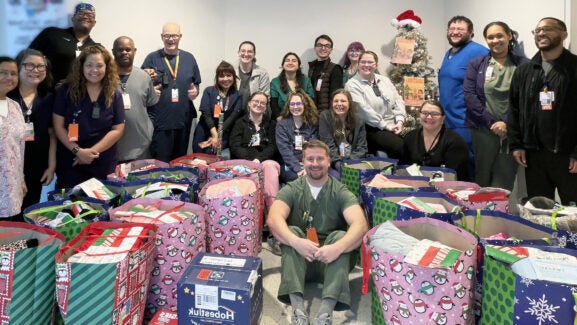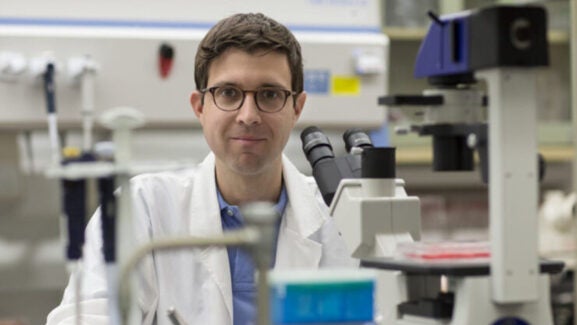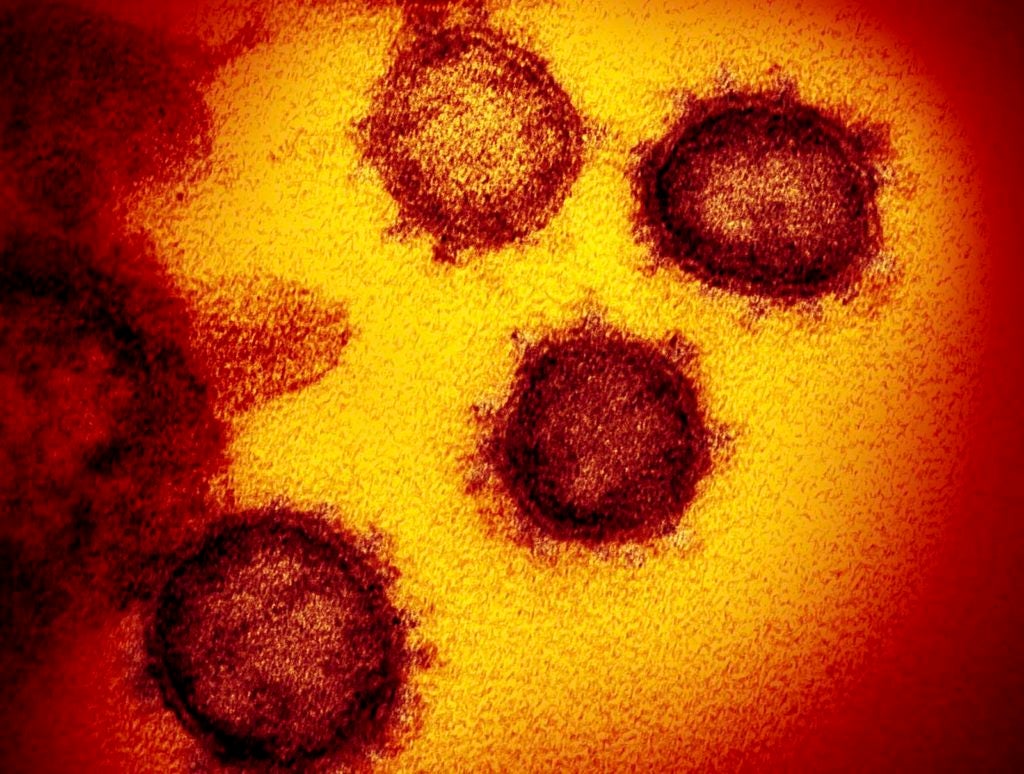

Dr. William Petri (Photo by Dan Addison, University Communications)
Here Is What You Need to Know About the New Coronavirus Variant, Omicron
Last week, the world woke to the news that a new, highly transmissible coronavirus variant — dubbed “omicron” — had been identified by researchers in South Africa. The number of new infections has since risen from the hundreds to the thousands in the country, where residents are mostly unvaccinated.
The news prompted many countries to close their borders or restrict travel from southern Africa, and the World Health Organization classified omicron a “variant of concern.”
“Omicron, B.1.1.529, is named as a variant of concern because it has some concerning properties,” said Maria Van Kerkhove, an infectious diseases epidemiologist with the organization. “This variant has a large number of mutations, and some of these mutations have some worrying characteristics.”
Researchers around the world are trying to learn as much as they can about omicron. UVA Today reached out with questions to infectious diseases expert Dr. Bill Petri, who recently was awarded the Maxwell Finland Award for Scientific Achievement by the National Foundation for Infectious Diseases.
Can you describe the new variant and its virility?
Petri: The omicron variant had never been seen until this month, and it was first identified in early November in South Africa. And what has captured everyone’s attention is that in South Africa, at least, it’s more infectious than is [the] delta [variant].
What happened was South Africa was having very, very low levels of infections — in Johannesburg, it was like 300 infections a day — and it’s now in the 10,000s as we’ve gone from the beginning of November to the end of November. And of that huge increase, every virus that’s been sequenced out of that increase is this omicron variant. And what is disappeared in Johannesburg is the delta variant. So, this shows that at least in Johannesburg, that omicron is more infectious than is delta. This is of significance because all of our current problems in the U.S. with COVID are because the delta variant was more infectious than the alpha variant.
The delta originated during the pandemic in India, and it was more infectious than the alpha variant, which originated in England with their wave of the pandemic. And the alpha variant, in turn, was more infectious than the original Wuhan strain. So, we sort of see is that as the virus evolves, it evolves to become more transmissible. That’s why everyone is interested, if not worried, about omicron.
Have any cases of omicron been detected yet in the United States?
Petri: Not that I know of. Ninety-nine-point-nine percent of all COVID in North America right now is delta. Our biggest problem today is delta just being much more infectious. It’s harder to protect against and it has been harder for the vaccines to protect against delta. And that was the reason for the booster shots, which were great. But if omicron turns out to be the same story in South Africa as in the U.S., we’ll just see more cases of COVID-19, unfortunately.
How effective are current vaccines against omicron?
Petri: There’s every indication that the vaccines work as well against omicron as they do against delta. They’ve seen some breakthrough infections in South Africa, but they’ve not been severe. So, it’s the same situation in the U.S. with delta, where the vaccine is less than 90% effective at preventing you from being infected, but over 90% effective in protecting you from having to be hospitalized with severe illness. That’s what people would anticipate can happen with omicron.
The World Health Organization warned Monday that global risks posed by the new omicron variant of the coronavirus were “very high,” despite significant questions about the variant itself. What are those risks? And what do we not yet know about omicron?
Petri: The risk is that since omicron is more transmissible in South Africa, that every country I would imagine that has like a very, very low vaccination rate like South Africa does, where only like one-fifth to one-third of people have been vaccinated, is going to see a surge in COVID infections as omicron becomes established as an infection. And that gives me hope as far as the U.S. goes, because 70% of adults have been vaccinated. So, it may not pose the same threat in our country since it is more highly vaccinated than South Africa.
But of course, most of the world is not highly vaccinated. One of the really good things about the Biden administration is that they’re donating hundreds of millions, if not billions, of doses of vaccine to the worldwide vaccination effort.
First there was the Wuhan variant, then the alpha and delta variants and now omicron. Is this going to keep happening? That dangerous variants will continue to emerge and case alarm and illness?
Petri: The omicron wave of the pandemic in South Africa could lead to a new “omicron-plus” variant. The virus continues to evolve and as long as there’s millions of people who can potentially be infected, there’s that many opportunities for the virus to continue to become more and more infectious. There’s an immediate worldwide threat that the countries with low vaccination rates are going to see more infections just because this is so much more easily spread.
One would anticipate that there will be continued evolution of the virus. What has not happened, fortunately, is the virus evolving to evade vaccines.
How concerned should people be about omicron?
Petri: I think what you should be concerned about is delta. We’re in a high transmission period right here in Charlottesville and Albemarle. It looked about a month ago like the peak of delta that that happened the beginning of September would disappear, and we’d be back to very, very low levels of transmission. And that hasn’t happened. So, as of the last week or so, things have leveled out to about half of the peak of infection. That’s a problem. And we know from last year that all the holiday travel prompted that terrible peak of COVID that we had in January.
What should people do to protect themselves?
Petri: If you’ve been vaccinated and have not yet done so, get a booster shot. If you have not been vaccinated, do so.
When you see someone who wasn’t vaccinated, and they came down with the infection, you feel badly because you hate for someone to suffer from an illness that could be prevented. It’s a terrible illness. If you come into the hospital requiring supplemental oxygen, the mortality rate can be as high as one in five. So, despite everything that we know today, we’re not able to save every single person with this infection, even if you’re hospitalized in a modern, great hospital like UVA.
We are weeks away from Christmas. Last year many people opted to forego travel and stayed home in their bubbles to protect themselves from COVID-19. What is your advice to people traveling this year, within the United States or abroad to countries whose borders remain open?
Petri: I think it’s dicey traveling abroad right now because the rules seem to change overnight and a lot of countries now have totally closed their borders to foreigners. Japan comes immediately to mind. So, the one thing I would worry about traveling overseas is the rules change, so maybe have some flexibility and realize, “Well, I may need to be quarantined for four days,” or you may need to get tested before you go home.
But I think that if you’re vaccinated and boosted, you can responsibly travel to spend time with family over the holidays. And for holiday gatherings I think it’s fine to ask everyone, “Are you vaccinated or not?” And people that are not vaccinated, one approach could be to take a rapid test before a big Christmas or Hanukkah gathering.
Latest News




